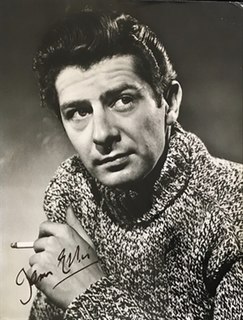A Quote by John Stuart Mill
A person may cause evil to others not only by his actions but by his inaction, and in either case he is justly accountable to them for the injury.
Related Quotes
What is the cause that one is hardened, and another readily moved to compunction? Listen! It springs from the will, in the latter case a good will, in the former an evil one. It springs also from the thoughts, in the former case evil thoughts, in the latter from the opposite; and similarly from actions, in the former case actions contrary to God, in the latter godly ones... it is by free choice of the will that every person either attains compunction and humility, or else becomes hard-hearted and proud.
In the Small group the individual can know the effects of his actions on his several fellows, and the rules may effectively forbid him to harm them in any manner and even require him to assist them in specific ways. In the Great Society many of the effects of a person's actions on various fellows must be unknown to him. It can, therefore, not be the specific effects in the particular case, but only rules which define kinds of actions prohibited or required, which must serve as guides to the individual.
The person who understands the evil in his own heart is the only person who is useful, fruitful, and solid in his beliefs and obedience. Others only delude themselves and thus upset families, churches, and all other relationships. In their self-pride and judgment of others, they show great inconsistency.
A person is either himself or not himself; is either rooted in his existence or is a fabrication; has either found his humanhood or is still playing with masks and roles and status symbols. And nobody is more aware of this difference (although unconsciously) than a child. Only an authentic person can evoke a good response in the core of the other person; only person is resonant to person.
While God is not the author of evil and He never prompts or condones sin, nothing occurs without His sovereign oversight. Others may choose to do evil deeds and God's people may suffer in the short term, but He will transform the evil intentions of evil people into opportunities for the enrichment of those in His care.
Every one should consider himself as intrusted not only with his own conduct, but with that of others; and as accountable, not only for the duties which he neglects, or the crimes that he commits, but for that negligence and irregularity which he may encourage or inculcate. Every man, in whatever station, has, or endeavours to have his followers, admirers, and imitators, and has therefore the influence of his example to watch with care.
He who knows only his own side of the case (argument) knows little of that. His reasons may be good, and no one may have been able to refute them. But if he is equally unable to refute the reasons on the opposite side, if he does not so much as know what they are, he has no ground for preferring either opinion
The only distinction between freedom and slavery consists in this: In the former state a man is governed by the laws to which he has given his consent, either in person or by his representative; in the latter, he is governed by the will of another. In the one case, his life and property are his own; in the other, they depend upon the pleasure of his master. It is easy to discern which of these two states is preferable.
Man's birth is a lottery; it may be in the pleasant home of ease and affluence, or in the hut of poverty; in either case it may be a stain or an honor. If he is born in poverty, and his future life throws a lustre over an humble birth, the reward will not only be great, but his name will stand higher on the roll of honor and virtue, than he who can only boast of his proud descent.
So long as men desire to live together, no man may initiate the use of physical force against others. . . . When a man attempts to deal with me by force, I answer him by force. It is only as retaliation that force may be used and only against the man who starts its use. No, I do not share his evil or sink to his concept of morality: I merely grant him his choice, destruction, the only destruction he had the right to choose: his own.







































